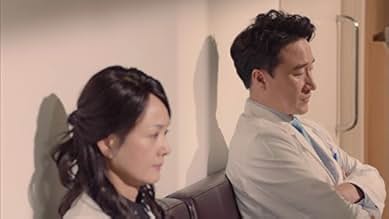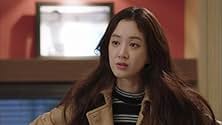Ajouter une intrigue dans votre langueSet within the backdrop of a hospital and a radio station. People with different problems get together and become happier.Set within the backdrop of a hospital and a radio station. People with different problems get together and become happier.Set within the backdrop of a hospital and a radio station. People with different problems get together and become happier.
Histoire
Commentaire en vedette
I'll admit that I didn't have high hopes for this drama, so I wasn't the least surprised when I got to the end and felt completely and utterly deflated. Bubble Gum is just another case of two childhood friends turned workaholics who end up falling for one another, and everything is pretty much an eyeroll from thereon. Storylines like this can either be such a hit or miss depending on how it's executed, and I don't mean in terms of how it's directed or produced, but whether there is an exhilarating character or plot development - both of which were absent throughout the whole 16 episodes.
Looking back, Park Ri-hwan (Lee Dong-wook) and Kim Haeng-ah (Jung Ryeo-won) were meant to be these two very easy-going and likeable leads who were successful in their respective fields, private, low-key, and no-drama kinds of people. Yet somehow, these characteristics also happened to be their biggest downfall because they turned into these boring, uncharismatic, and passive puppet protagonists who never took it upon themselves to reel the story forward. Rather, the driving force ended up being the supporting characters, each of whom made you want to claw your eyes out. They were frustrating, annoying, and unbearable to watch for the opposite reason given above in describing Ri-hwan and Haeng-ah's character traits. A few examples include but are not limited to the stereotypical rich mum or tiger mum, overbearing best friend, irritating or desperate second female lead AND male lead, and pushy/cringey ancillary characters who contributed nothing to the plot.
By the end, all the decision-making authority in moving the story forward came from the supporting characters, which if you think about it, effectively negates the purpose of the main characters whose roles were meant to be of far more significance and weight. However, all Ri-hwan and Haeng-ah did was engage in self-blame and immaturity despite being two fully-matured adults who were capable of making their own decisions in life.
To make matters worse, the second female lead (Hong Yi-seul) was portrayed as this academically intelligent woman turned hopeless romantic caught up in a one-sided love. The woman was just clingy, relentless, and increasingly petty when it came to wanting to get Ri-hwan's undivided attention, and understandable that one would get jealous upon hearing from her arranged suitor (Ri-hwan) in person that he was in love with his best friend, but nothing changed for this was not breaking news, and it was pretty clear from the first episode that Ri-hwan had absolutely zero interest in pursuing her but just stuck around to be the nice guy he was.
Similarly, Haeng-ah's ex-boyfriend, Kang Suk-joon (second male lead) was just as infuriating to watch as Yi-seul. His character was stubborn, arrogant, and desperate, and not one bit of me felt sorry for him each time he tried to convince Haeng-ah into giving him a second chance but was instead turned down. Although he wasn't a toxic or malicious person per se, his presence inhibited Haeng-ah's growth in the drama and there was just no second male syndrome to simply put.
Perhaps the most annoying character though was Ri-hwan's mother, Park Sun-young, who was controlling and slightly calculating. If she had accepted that Ri-hwan and Haeng-ah were meant to be together from the start, then she wouldn't have had to make things so difficult for herself and the couple. But every decision she made was outright selfish even though she claimed it was for the best for the two adults.
Other annoying characters included Haeng-ah's best friend and co-worker, Noh Tae-hee, who became increasingly intense, annoying, and controlling as each episode went by, as well as a radio host in her 40s, Oh Se-young, whose character just screamed "baby". Although I liked that Se-young's character challenged the stigma surrounding big age-gap relationships, and Tae-hee made all these attempts to woo a divorced man at her workplace, both the females' acting was just too over the top for my liking, and their characters' struggles seemed to overshadow that of Ri-hwan's and Haeng-ah's.
I couldn't also help but get frustrated as a viewer when Ri-hwan was confronted by Yi-seul's older brother, Hong Jung-woo, during a heated scene. Involving overprotective chaebol siblings who use bribes to get what they want is such an overused cliché which dumbs down the plot. This is even more so the case when Jung-woo is so afraid of heartbreak getting to Yi-seul and says to Ri-hwan of words to the following effect: "I want my sister to marry the man she loves. More than that, I want her to marry someone who loves her. If you can't change to be that person... why don't you go somewhere where you will not be seen. For example, a place where neither I nor Yi-seul can suddenly appear like this." ... *EYEROLLS*
In the end, the dialogue was watered down by petty remarks and mundane rants about love and life which had little impact on the plot. Although I appreciated this drama helping shed light on a lot of the stigma surrounding mental health including taboo relationships prevalent in modern society, I thought both of these aspects could have been better developed into something that was less cringeworthy. On the flipside, I gave it some well-deserved stars for the chemistry between the leads, and the ratio show setting which acted as a place of solace for people to call in and talk about their personal problems.
"To lose something and to forget something ... There's no way to be sad about those things... If the bubble pops, then you can just blow another one. The small happiness that you feel when chewing bubble-gum... It's not any different from any other kind of happiness." - Ri-hwan
Looking back, Park Ri-hwan (Lee Dong-wook) and Kim Haeng-ah (Jung Ryeo-won) were meant to be these two very easy-going and likeable leads who were successful in their respective fields, private, low-key, and no-drama kinds of people. Yet somehow, these characteristics also happened to be their biggest downfall because they turned into these boring, uncharismatic, and passive puppet protagonists who never took it upon themselves to reel the story forward. Rather, the driving force ended up being the supporting characters, each of whom made you want to claw your eyes out. They were frustrating, annoying, and unbearable to watch for the opposite reason given above in describing Ri-hwan and Haeng-ah's character traits. A few examples include but are not limited to the stereotypical rich mum or tiger mum, overbearing best friend, irritating or desperate second female lead AND male lead, and pushy/cringey ancillary characters who contributed nothing to the plot.
By the end, all the decision-making authority in moving the story forward came from the supporting characters, which if you think about it, effectively negates the purpose of the main characters whose roles were meant to be of far more significance and weight. However, all Ri-hwan and Haeng-ah did was engage in self-blame and immaturity despite being two fully-matured adults who were capable of making their own decisions in life.
To make matters worse, the second female lead (Hong Yi-seul) was portrayed as this academically intelligent woman turned hopeless romantic caught up in a one-sided love. The woman was just clingy, relentless, and increasingly petty when it came to wanting to get Ri-hwan's undivided attention, and understandable that one would get jealous upon hearing from her arranged suitor (Ri-hwan) in person that he was in love with his best friend, but nothing changed for this was not breaking news, and it was pretty clear from the first episode that Ri-hwan had absolutely zero interest in pursuing her but just stuck around to be the nice guy he was.
Similarly, Haeng-ah's ex-boyfriend, Kang Suk-joon (second male lead) was just as infuriating to watch as Yi-seul. His character was stubborn, arrogant, and desperate, and not one bit of me felt sorry for him each time he tried to convince Haeng-ah into giving him a second chance but was instead turned down. Although he wasn't a toxic or malicious person per se, his presence inhibited Haeng-ah's growth in the drama and there was just no second male syndrome to simply put.
Perhaps the most annoying character though was Ri-hwan's mother, Park Sun-young, who was controlling and slightly calculating. If she had accepted that Ri-hwan and Haeng-ah were meant to be together from the start, then she wouldn't have had to make things so difficult for herself and the couple. But every decision she made was outright selfish even though she claimed it was for the best for the two adults.
Other annoying characters included Haeng-ah's best friend and co-worker, Noh Tae-hee, who became increasingly intense, annoying, and controlling as each episode went by, as well as a radio host in her 40s, Oh Se-young, whose character just screamed "baby". Although I liked that Se-young's character challenged the stigma surrounding big age-gap relationships, and Tae-hee made all these attempts to woo a divorced man at her workplace, both the females' acting was just too over the top for my liking, and their characters' struggles seemed to overshadow that of Ri-hwan's and Haeng-ah's.
I couldn't also help but get frustrated as a viewer when Ri-hwan was confronted by Yi-seul's older brother, Hong Jung-woo, during a heated scene. Involving overprotective chaebol siblings who use bribes to get what they want is such an overused cliché which dumbs down the plot. This is even more so the case when Jung-woo is so afraid of heartbreak getting to Yi-seul and says to Ri-hwan of words to the following effect: "I want my sister to marry the man she loves. More than that, I want her to marry someone who loves her. If you can't change to be that person... why don't you go somewhere where you will not be seen. For example, a place where neither I nor Yi-seul can suddenly appear like this." ... *EYEROLLS*
In the end, the dialogue was watered down by petty remarks and mundane rants about love and life which had little impact on the plot. Although I appreciated this drama helping shed light on a lot of the stigma surrounding mental health including taboo relationships prevalent in modern society, I thought both of these aspects could have been better developed into something that was less cringeworthy. On the flipside, I gave it some well-deserved stars for the chemistry between the leads, and the ratio show setting which acted as a place of solace for people to call in and talk about their personal problems.
"To lose something and to forget something ... There's no way to be sad about those things... If the bubble pops, then you can just blow another one. The small happiness that you feel when chewing bubble-gum... It's not any different from any other kind of happiness." - Ri-hwan
- cinnahh
- 4 juill. 2020
- Lien permanent
Meilleurs choix
Connectez-vous pour évaluer et surveiller les recommandations personnalisées
Détails
- Date de sortie
- Pays d’origine
- Site officiel
- Langue
- Aussi connu sous le nom de
- Bubblegum
- Consultez plus de crédits d'entreprise sur IMDbPro
- Couleur
Contribuer à cette page
Suggérer une modification ou ajouter du contenu manquant



























